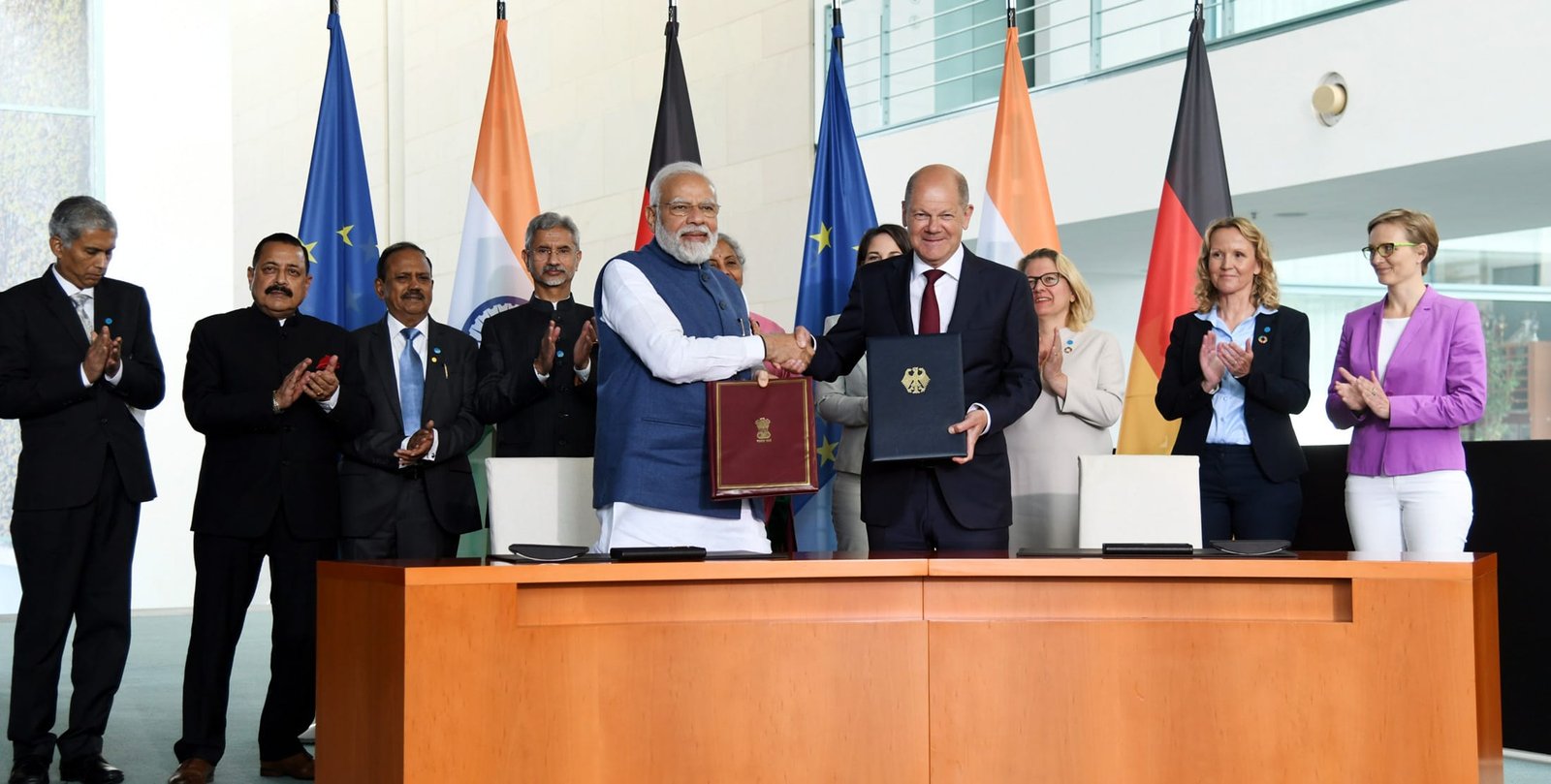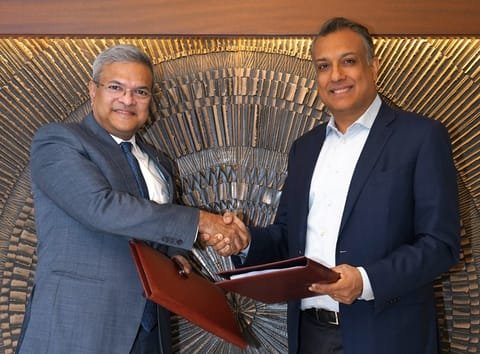Indo-German Hydrogen Task Force to work on green energy
German Minister for Economic Affairs and Climate Change Dr. Robert Habeck has expressed his interest in opportunities for investment in offshore wind farms in India given German expertise in the sector as part of Prime Minister Narendra Modi’s visit to Germany on 2 May 2022.
He expressed interest in wind energy at the signing of a Joint declaration of Intent on Indo-German Hydrogen Task Force virtually on 2 May 2022 with Minister for Power and New and Renewable Energy (MNRE) R.K Singh.
The Indo-German Green Hydrogen Task Force aims to strengthen mutual cooperation in production, utilization, storage and distribution of Green Hydrogen through building enabling frameworks for projects, regulations and standards, trade and joint research and development (R&D) projects.
Germany has developed an ambitious National Hydrogen Strategy with the aim to assume global leadership in hydrogen technologies.
Blessed with abundant renewable energy potential and experience of implementing renewable energy projects, India can produce low-cost Green Hydrogen to progressively decarbonize a range of industry sectors, and also export it to meet global demand.
With strengths in innovation and manufacturing, Germany is already implementing numerous hydrogen projects.
Likewise, India has launched the National Green Hydrogen Mission with the goal to make India the global hub of Green Hydrogen production and export.
Trade of Green Hydrogen and or its derivatives such as Green Ammonia and Green Methanol would form the cornerstone of the collaboration. Institutional collaboration in joint research, light house projects, innovation clusters and hydrogen hubs would catalyse the synergistic efforts of the two countries, MNRE said.
The ambitious deployment targets would also create attractive investment and business opportunities for industries from both countries, it added.
India and Germany share the common goal to decarbonize their economies. Both nations are committed to develop a national green hydrogen economy. The common long-term goal is to reduce emissions and protect the environment.
This requires a global upscale of green hydrogen production and offtake. India and Germany therefore support the establishment of a global green hydrogen economy, to facilitate the achievement of the goals under the Paris Agreement.
Both sides are convinced that common goals can be achieved better in close cooperation, building on individual strengths and capacities.
The agreement is part of the Indo-German Partnership for Green and Sustainable Development including Eur1.3 billion financing for projects following the visit by Prime Minister Modi who held the 6th India-Germany Inter-Governmental Consultations with Federal Chancellor Olaf Scholz on 2 May 2022.
The Green Hydrogen Task Force is part of the Indo-German Green Hydrogen Roadmap supported by the Indo-German Energy Forum (IGEF).
It will have German’s financial and technical cooperation including offer of concessional loans of up to Eur1 billion from 2020 to 2025 depending on high quality project preparation and the availability of funds.
Other details related to projects are:
Establish an Indo-German Renewable Energy Partnership focusing on innovative solar energy and other renewables, including the associated challenges for electricity grids, storage and market design to facilitate a just energy transition. The partnership would also support creation of a circular economy for solar technologies, according to a joint statement issued following the Modi-Scholz consultation meeting.
Establish a lighthouse cooperation on “Agroecology and Sustainable Management of Natural Resources” to benefit the rural population and small-scale farmers in India in terms of income, food security, climate resilience, improved soil, biodiversity, forest restoration and water availability and to promote Indian experience globally. Germany expressed its intention to provide financial and technical cooperation including concessional loans of up to Eur300 million until 2025 depending on high quality project preparation and the availability of funds.
Further examine collaboration on Green Energy Corridors, e.g. the Leh-Haryana transmission line and the project of a carbon neutral Ladakh.
Deepen cooperation in restoring forest landscapes under the Bonn Challenge as an important measure to fight poverty, preserve and restore biodiversity and prevent and attenuate climate change, acknowledging also the UN Decade on Ecosystem Restoration 2021-2030 as a framework for intensified political partnership and dialogue and accelerated action to increase the area of healthy ecosystems and end their loss, fragmentation and degradation.
Deepen cooperation on the creation of suitable conditions for the successful and sustainable use of green technologies, including in the area of reduction of air pollution.
Work together on Triangular Cooperation, based on individual strengths and experiences in development cooperation and offer sustainable, viable and inclusive projects in third countries to support the achievement of SDGs and climate targets.
In addition, and in the context of the Indo-German Partnership for Green and Sustainable Development, both sides welcomed the progress of existing initiatives including:
The Indo-German Energy Forum launched in 2006 and flagship cooperation programs initiated under this partnership. They agreed to further enhance its strategic dimension and private sector involvement.
The cooperation within the Indo-German Environment Forum (IGEnvF), which held its last meeting in February 2019 in Delhi. They strive to encourage the participation of provincial and municipal authorities taking into account the federal structure of both countries.
The meetings of the Joint Working Group on Biodiversity last held virtually in February 2021, where both sides underlined their support to adopt an ambitious post-2020 global biodiversity framework with strong targets at CBD COP15 and expressed their intention to work towards the establishment of tangible cooperation.
The good opportunities created by the Joint Working Group on Waste and Circular Economy, in particular to further intensify the cooperation and exchange of experiences between both countries. They agreed to continue and intensify the Indo-German Environment Cooperation by supporting the effective and efficient implementation of ambitious objectives and policies in order to prevent litter, especially plastics, entering the marine environment as set in SDG target 14.1 and to especially focus on the implementation of SDG target 8.2 (technological upgrading and innovation), 11.6 (municipal and other waste management) and 12.5 (recycling and reduction of waste).India and Germany agreed to closely cooperate in the UNEA towards establishing a global legally binding agreement on plastic pollution.
The Indo-German Partnership on Green Urban Mobility launched in 2019 and the substantive development cooperation portfolio that has been developed. Accelerated action and collaboration is envisaged to support the integration of sustainable modes of transport, such as metros, light metros, fuel efficient low-emission and electric bus systems, non-motorized transport, and facilitate early integrated planning for sustainable mobility for all with a view to work on concrete targets for the joint work in the partnership until 2031.
The collaboration between NITI Aayog and BMZ in developing the country’s first SDG Urban Index & Dashboard (2021-22) aimed at strengthening SDG localization at the city level and for fostering data-driven decision making as well as plans for further SDG implementation at state and district level.
Both sides reiterated their intention to continue their successful cooperation on urban development within the International Smart Cities Network. In order to promote multilateral experience sharing and learning on the subject of Smart Cities they agreed on a mutual Smart City Online-Symposium in 2022.
Both sides agreed to continue the regular meetings of the Joint Indo-German Working Group on sustainable urban development, acknowledging the significant role of sustainable and resilient cities to achieve the objectives laid out by the Paris Agreement and the Agenda 2030.
Both sides reaffirmed the constructive role of the Joint Working Group on Agriculture, Food Industry and Consumer Protection, which held its last meeting in March 2021. They expressed satisfaction about the achieved results and continued willingness of cooperation based on existing MoUs in the fields of sustainable agricultural production, food safety, agricultural training and skilling, post-harvest management and agricultural logistics.
Both Governments appreciated the final stage of the successful flagship project in the Indian seed sector in order to contribute to promoting farmers’ access to high quality seeds as a fundamental basis for sustainable agricultural production. They noted the second bilateral cooperation project started in August 2021, which aims to support ongoing reform efforts to strengthen and modernize India’s agricultural market development.
Both sides expressed willingness to develop cooperation activities in the field of food safety based on existing cooperation agreements.
Both sides acknowledged the MoU signed between the German Agribusiness Alliance (GAA) and Agriculture Skill Council of India (ASCI) on establishment of “Indo-German Centers of Excellence in Agriculture” aimed at promoting practical skill development in agriculture in India by bridging gaps and upgrading skill of farmers and wage workers.
Both sides agreed that the technology and knowledge transfer in the food and agriculture sector is key to more sustainable food systems and that tailored research cooperation projects in the area of food safety by the “Bundesinstitut für Risikobewertung” (BfR) and FSSAI can be considered.
The International Solar Alliance (ISA): Both sides agreed to deepen collaboration and support by building on the synergies of Indian and German strategic priorities and associated global cooperation effortsin the field of solar energy.
The InsuResilience Global Partnership and the Coalition for Disaster Resilient Infrastructure: Both sides agreed to strengthen collaboration on risk finance and insurance solutions against climate and disaster risks as well as capacity building via the Global Initiative for Disaster Risk Management. Germany welcomed the Indian announcement to become a member of the InsuResilience Global Partnership.
Both sides agreed to enhance collaboration with the Indian and German private sector in the context of public-private partnerships for innovation and investments in SDGs and climate goals in particular through DeveloPPP and structured funding mechanisms to mobilise the private sector.
Both sides expressed their appreciation for the preparation for the UN 2023 Water Conference and underlined their support for SDG 6 and other water-related goals and targets of the 2030 Agenda for Sustainable Development. fiinews.com











